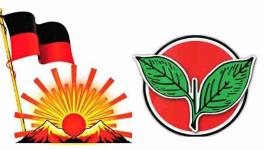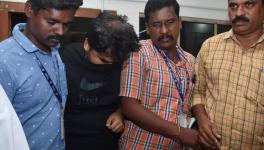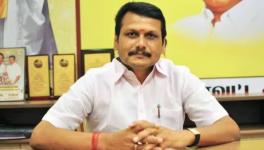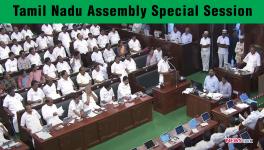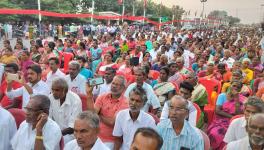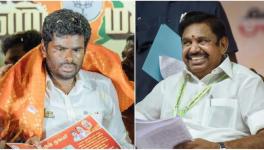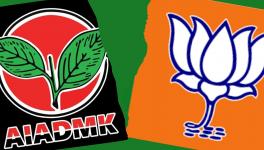TN Assembly Elections: Will the AIADMK Survive the Acid Test?
The All India Anna Dravida Munnetra Kazhagam (AIADMK), founded in 1972 by late chief minister M.G. Ramachandran (MGR), is at a crossroads, in the second such instance in its history. The party has managed to keep its vote-share intact all through its near five-decade existence but the 2021 assembly elections pose a different challenge altogether.
The twin leadership of Edappadi K. Palaniswami (EPS) and O. Panneerselvam (OPS) has managed to hang onto power since the demise of late Chief Minister J. Jayalaithaa in 2016, their unity attributed to the over four-year tenure in office that followed.
Aside from the anti-incumbency and simmering internal squabbles, the Sasikala factor is seemingly haunting the party. The party huddled together to maintain unity since her release though resentment is swelling across the state with her release.
The challenge before OPS and EPS is to keep the flock together and hold on to their traditional vote base for a third successive mandate, a feat only achieved by the late MGR.
AIADMK: A PARTY OF MGR FANS?
After being ousted from the Dravida Munnetra Kazhagam (DMK), MGR formed the AIADMK and won three consecutive elections in 1977, 1980 and 1984. His first tenure was cut short by two years after the government was dismissed by an Indira Gandhi-helmed Centre. During his second tenure, however, Indira was assassinated and the man encountered health issues leading to a dissolution of the assembly a year before its term ended. He continued as Tamil Nadu CM till his death in 1987.
The charismatic MGR, a household name in the state thanks to his film career, was one among the major factors which led to the DMK capturing power in 1967 and 1971. His ouster, after he levelled corruption charges against another Dravidian stalwart M. Karunanidhi, increased his appeal among the masses.
He used his films to further his politics, leading to a hattrick of victories in the assembly elections – a feat unmatched by any other leader since. MGR nurtured an array of second rung leaders from different regions in the state, a move which helped in extending the base of the party.
After splitting from the DMK the party moved away from the Dravidian school of thought. The MGR fans association was literally converted into AIADMK, a party with a strong vote base which did not possess a strong cadre.
‘VOTE SHARE REMAINS INTACT’
The AIADMK has fared well in the assembly elections with the exception of 1989 when there was a split in the party. The year 1996 too saw strong anti-incumbency which swept all major leaders including Jayalalithaa, leaving a meagre four seats for the party.
The 1989 elections saw a split in the party, with Jayalalithaa leading one faction while MGR’s widow, Janaki Ramachandran, the first woman CM of the state, led the other. Janaki took over the reigns after MGR’s demise in December 1987, holding fort for just 24 days. The two factions together garnered around 30% of the votes but both lost badly, leading to the unification of the party and Jayalalithaa taking up the reigns.
In fact, the party has managed to improve on its vote share since the 1996 debacle in every assembly election since. ITs vote share improved even during a 2006 loss to the DMK.
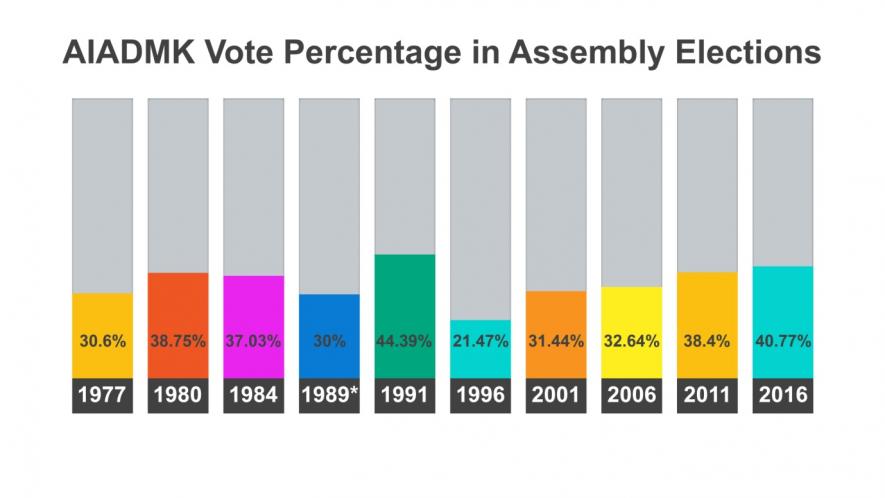
*In 1989, the AIADMK was split in to two, the vote per cent is the vote share of the two factions taken together
Though the party fared poorly in 1989 and 2006, its vote-share remained intact, a fact which still plays in its favour. The electoral performance of the party in 2016 was hailed as historic since the party managed to retain power with an increased vote share of 40.77%.
The party has managed to secure a respectable number of seats in the assembly elections with the exception of 1989 and 1996. The 61 seats won by the party in 2006 was at the time then the highest for an opposition party in the TN Assembly.
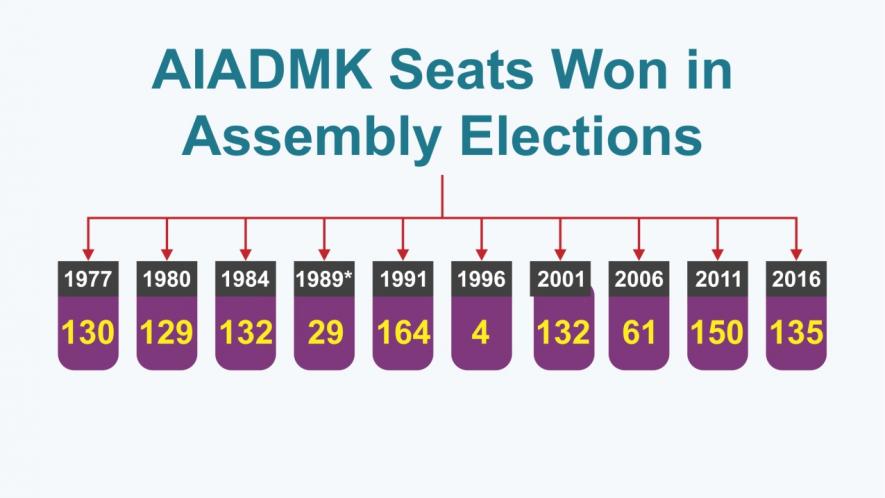
*In 1989, the AIADMK was split in to two, the seats mentioned include seats won by both factions (Jayalalithaa faction -27, Janaki faction-2)
But the recent drubbing it suffered in the 2019 General Elections together with the Bharatiya Janata Party (BJP) and the setback in the rural local body polls last month are concerning. In elections to the Parliament the party has drawn a blank in 1996 and 2004.
VOTE BASE UNDER THREAT?
The party’s traditional voter base in different parts of the state, particularly among rural women, is vital. The votes of the dominant Gounder caste, the Arunthathiyar community – a scheduled caste community in the Kongu belt – and the Mukkulathor votes in the south are highly crucial for the party.
These equations did not favour the party in 2019 as the National Democatic Alliance (NDA) managed a lone seat out of the 39 in the state. The absence of a second line of leadership, which Jayalalithaa never groomed, and the anti-incumbency wave against the BJP government resulted in a literal washout.
However, the bye-elections held alongside the general elections came as a huge relief with the party managing to regain a majority after a split was orchestrated by Sasikala and TTV Dhinakaran in 2018, leading to the formation of Amma Makkal Munnetra Kazhagam (AMMK).
The AIADMK’s alliance with the BJP has been surprising, a move which may have even hurt it as bye-election results and the general election results did not add up.
The results of the rural local body elections – held after a three-year delay – too jolted the AIADMK camp with the DMK gaining an upper hand. The setback forced the party to defer the urban local body elections.
IMPENDING ELECTIONS AND A FLURRY OF SOPS
The successive setbacks for the party have led to a flurry of announcements by the AIADMK government, the most recent one being the waiver of agricultural loans availed by the farmers from cooperative banks to the tune of Rs 12,110 crores.
The opposition parties and farmers associations have welcomed the announcement and the DMK has even claimed credit for the government’s decision.
The delta region, known for its high volume of farm produce and being tough nut to crack for the party, is said to benefit most from the waiver. The party’s recent moves have given the impression that it is seeking to consolidate its vote base in the west and gain an upper hand in the delta region.
Earlier, the AIADMK government announced a cash gift of Rs 2,500 for Pongal along with a grocery kit, even while denying major relief during the lockdown period. The inauguration of Mini Clinics, reservation for government school students in medical admissions, concrete homes for all, all aside from a publicity blitz in the print and visual media, are signal of the party’s intentions.
However, the arrival of Sasikala – Jayalalithaa’s former aide – seems to haunt the party more than anything else.
IS THE PARTY JITTERY?
AIADMK ministers met the director general of police twice within a week to complain about Sasikala using the party flag after her release from prison. The Krishnagiri district police have issued an advisory to the office bearers of the AMMK on the use of flags and maintaining disciple while according welcome to her on arrival from Bengaluru.
The party’s headquarters has been cordoned with barricades and a huge police presence while the Jayalalitha memorial was closed for maintenance soon after its inauguration on January 27.
The fear surrounding her arrival is palpable in the AIADMK camp, with ministers levelling charges of her trying to hijack the party. Sasikala seems to wield considerable influence among many ministers and local level office-bearers.
Though the ministers seem content enough to remain silent for now, the party had to terminate many office bearers for welcoming her by putting up posters. OPS and EPS have requested the party cadre to work in unison for the party’s victory in the upcoming elections. Both have refrained from commenting on her arrival.
Even though the party has managed to keep its flock together since 2016 despite several setbacks, namely an OPS revolt and the formation of the AMMK, the situation at present seems to be send jitters among its leaders. The possibility of another electoral victory is a challenge and the undercurrents within the party could further damage its prospects in the upcoming elections.
Get the latest reports & analysis with people's perspective on Protests, movements & deep analytical videos, discussions of the current affairs in your Telegram app. Subscribe to NewsClick's Telegram channel & get Real-Time updates on stories, as they get published on our website.









